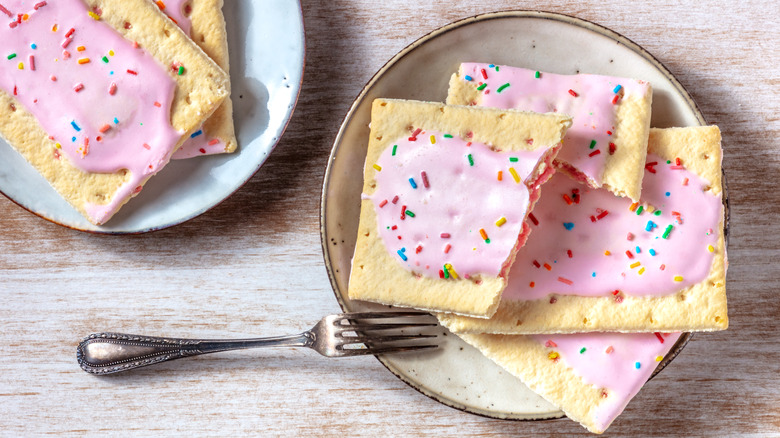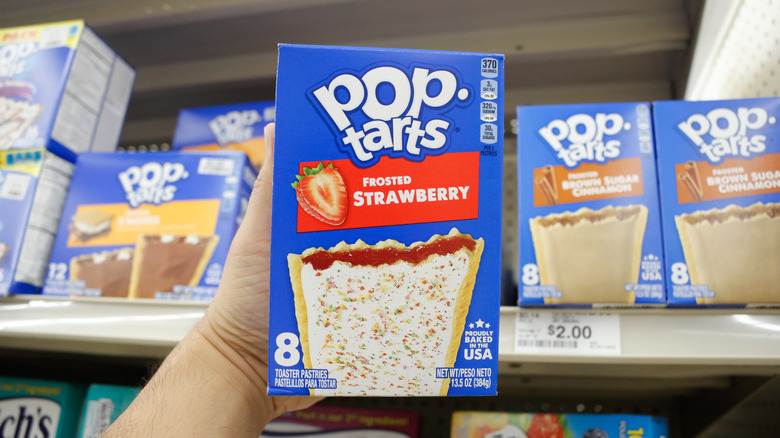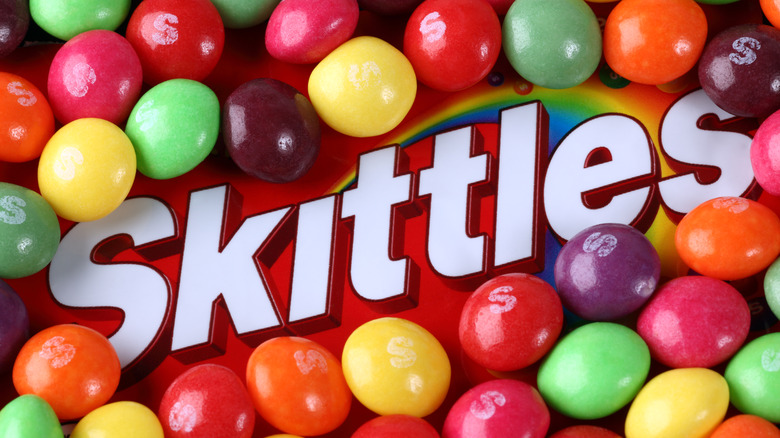The Reason Pop-Tarts Are Banned In So Many Countries
Since their inception in 1963, Pop-Tarts have become a staple served at breakfast tables across America. They also make for a great late-night snack, but they're one not everybody in the world can enjoy. That's because, due to their being produced with certain ingredients, the toaster pastries are banned in certain countries.
Countries belonging to the E.U. have taken the step to ban specific food dyes in consumables sold due to health concerns stemming from these additives. Pop-Tarts contain artificial food dyes, such as Red 40, Yellow 5, and Yellow 6, which, barring a handful of exceptions, aren't allowed in products sold there. Another food coloring, Blue 1, added to Pop-Tarts Blueberry and Wild Berry flavors, is also considered suspect and is consequently outlawed in some parts of the world, like Norway. Where not prohibited throughout the European Union, Pop-Tarts must have a warning label attached to the product informing customers that the product includes these potentially harmful chemicals.
The additives in question have been linked to various adverse health conditions, such as potentially being carcinogenic, causing allergy complications, and possibly contributing to hyperactivity in children. The question is, why are Pop-Tarts considered safe in some places and not in others? The answer lies in the conclusions various regulatory agencies discern from research studies regarding these chemicals.
Are Pop-Tarts banned because they are dangerous?
While it may raise eyebrows to know that other countries have deemed some of America's favorite snacks unsafe to consume, this doesn't necessarily mean the products are dangerous. The FDA is constantly testing the food Americans enjoy in laboratories across the nation, and they have some of the most rigorous standards in the world. Amanda Deering, Purdue Associate Professor of Produce Food Safety, said about the FDA's testing measures to WTHR, "They review these things all the time. So, if there's new data that comes out that says, oh, you know, we should show that this dye is actually more dangerous than what we thought, they're going to review that and then put those restrictions on it."
The food additives banned in some countries may pose a health risk, but more research is needed to know for sure. In the meantime, even though the FDA consistently tests products to ensure they are safe for Americans to eat, it is always important to check the labels on any food you buy from the store to see if they include any ingredients you aren't comfortable consuming. Pop-Tarts are not the only food product outlawed outside of the U.S. due to the ingredients they contain.
Other countries ban many foods Americans enjoy
While Americans might think "They're g-r-r-r-eat," popular breakfast cereal Frosted Flakes received a ban in Japan, the U.K., and other European countries due to its incorporation of butylated hydroxytoluene — a flavor enhancer. Coffee-mate creamer is likewise restricted in the E.U. because it contains an unacceptable level of trans fat within the product.
Some other products not allowed in other countries include Skittles and Gatorade. A Taste of the Rainbow consists partly of titanium dioxide — banned in the European Union because of its possible link to causing cancer. Gatorade was once outlawed in Europe because it incorporated brominated vegetable oil, though it has since removed the problematic ingredient. It is still off-limits in Norway and Hungary due to its Yellow 5 and 6 content.
Though it may feel overwhelming to know that so many foods we enjoy in the States are under a seemingly more watchful eye elsewhere, it's nothing to fret over. In her interview with WTHR, Deering said this of food safety in the U.S.: "We have one of the safest food systems in the world." She added, ". . . and I do a lot of international work all over the world. And, by far, we have the safest food supply. So, there are a bunch of very talented scientists that do their due diligence and are absolutely confident that what they say is safe, is safe."


